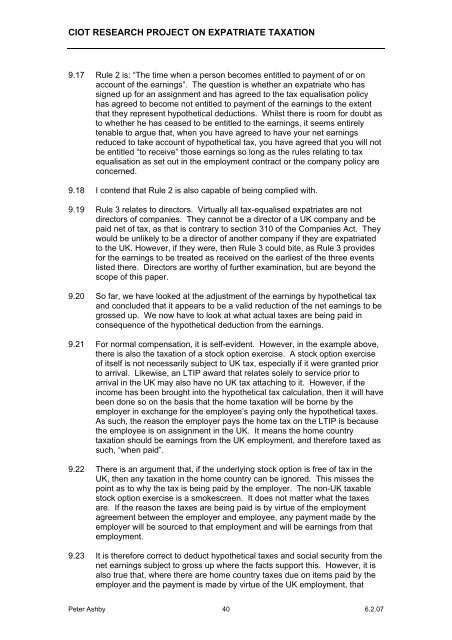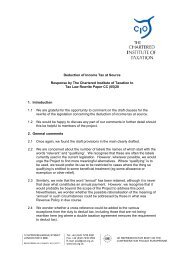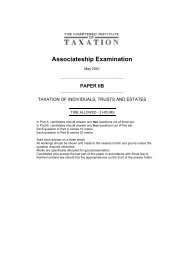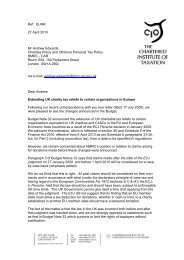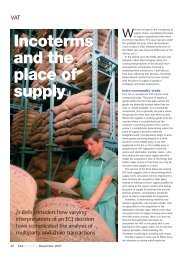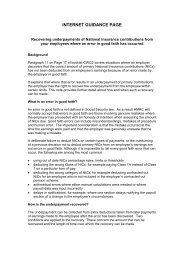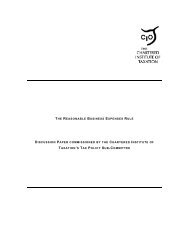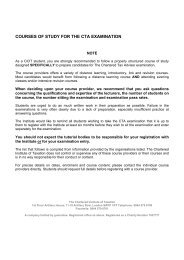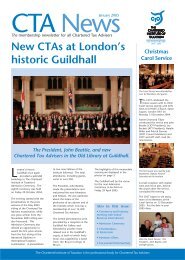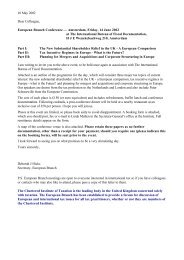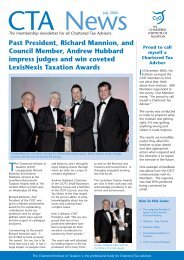Expatriate taxation - CIOT - The Chartered Institute of Taxation
Expatriate taxation - CIOT - The Chartered Institute of Taxation
Expatriate taxation - CIOT - The Chartered Institute of Taxation
Create successful ePaper yourself
Turn your PDF publications into a flip-book with our unique Google optimized e-Paper software.
<strong>CIOT</strong> RESEARCH PROJECT ON EXPATRIATE TAXATION<br />
9.17 Rule 2 is: “<strong>The</strong> time when a person becomes entitled to payment <strong>of</strong> or on<br />
account <strong>of</strong> the earnings”. <strong>The</strong> question is whether an expatriate who has<br />
signed up for an assignment and has agreed to the tax equalisation policy<br />
has agreed to become not entitled to payment <strong>of</strong> the earnings to the extent<br />
that they represent hypothetical deductions. Whilst there is room for doubt as<br />
to whether he has ceased to be entitled to the earnings, it seems entirely<br />
tenable to argue that, when you have agreed to have your net earnings<br />
reduced to take account <strong>of</strong> hypothetical tax, you have agreed that you will not<br />
be entitled “to receive” those earnings so long as the rules relating to tax<br />
equalisation as set out in the employment contract or the company policy are<br />
concerned.<br />
9.18 I contend that Rule 2 is also capable <strong>of</strong> being complied with.<br />
9.19 Rule 3 relates to directors. Virtually all tax-equalised expatriates are not<br />
directors <strong>of</strong> companies. <strong>The</strong>y cannot be a director <strong>of</strong> a UK company and be<br />
paid net <strong>of</strong> tax, as that is contrary to section 310 <strong>of</strong> the Companies Act. <strong>The</strong>y<br />
would be unlikely to be a director <strong>of</strong> another company if they are expatriated<br />
to the UK. However, if they were, then Rule 3 could bite, as Rule 3 provides<br />
for the earnings to be treated as received on the earliest <strong>of</strong> the three events<br />
listed there. Directors are worthy <strong>of</strong> further examination, but are beyond the<br />
scope <strong>of</strong> this paper.<br />
9.20 So far, we have looked at the adjustment <strong>of</strong> the earnings by hypothetical tax<br />
and concluded that it appears to be a valid reduction <strong>of</strong> the net earnings to be<br />
grossed up. We now have to look at what actual taxes are being paid in<br />
consequence <strong>of</strong> the hypothetical deduction from the earnings.<br />
9.21 For normal compensation, it is self-evident. However, in the example above,<br />
there is also the <strong>taxation</strong> <strong>of</strong> a stock option exercise. A stock option exercise<br />
<strong>of</strong> itself is not necessarily subject to UK tax, especially if it were granted prior<br />
to arrival. Likewise, an LTIP award that relates solely to service prior to<br />
arrival in the UK may also have no UK tax attaching to it. However, if the<br />
income has been brought into the hypothetical tax calculation, then it will have<br />
been done so on the basis that the home <strong>taxation</strong> will be borne by the<br />
employer in exchange for the employee’s paying only the hypothetical taxes.<br />
As such, the reason the employer pays the home tax on the LTIP is because<br />
the employee is on assignment in the UK. It means the home country<br />
<strong>taxation</strong> should be earnings from the UK employment, and therefore taxed as<br />
such, “when paid”.<br />
9.22 <strong>The</strong>re is an argument that, if the underlying stock option is free <strong>of</strong> tax in the<br />
UK, then any <strong>taxation</strong> in the home country can be ignored. This misses the<br />
point as to why the tax is being paid by the employer. <strong>The</strong> non-UK taxable<br />
stock option exercise is a smokescreen. It does not matter what the taxes<br />
are. If the reason the taxes are being paid is by virtue <strong>of</strong> the employment<br />
agreement between the employer and employee, any payment made by the<br />
employer will be sourced to that employment and will be earnings from that<br />
employment.<br />
9.23 It is therefore correct to deduct hypothetical taxes and social security from the<br />
net earnings subject to gross up where the facts support this. However, it is<br />
also true that, where there are home country taxes due on items paid by the<br />
employer and the payment is made by virtue <strong>of</strong> the UK employment, that<br />
Peter Ashby 40 6.2.07


